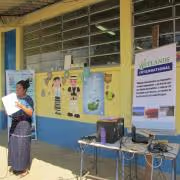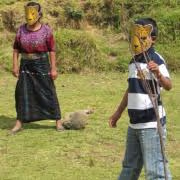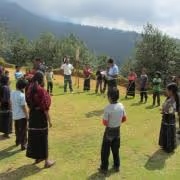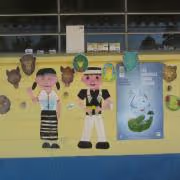Celebrating the World Wetlands Day 2013
04
March
2013
Type
Grantee insights
Area of funding
Humanitarian Innovation
Focus areas
No items found.
Year

The World Wetlands Day on the 2nd of February is very important for those who work in environmental conservation. For the Bio-right project the value of ecosystems in preventing and reducing the impacts of disasters is a key element. Therefore additional classroom activities were organized in two rural primary schools in the Department of Sololá: on February 7th in the community Pasaqajuyup, Nahualá municipality, and February 8th in Tzamabaj community in the Municipality of Santa Catarina Ixtahuacán. It was attended by the nine Directors of Schools of the areas where involved in the Bio-rights and Partners for Resilience Programme. The activities were organized with the support of the Technical Administrative Coordinator (CTA) of the Ministry of Education, the National Council of Protected Areas CONAP, and the Guatemalan Administrative Authority of the Ramsar Convention, providing materials for the children’s games.
For children to have a better understanding of wetlands and the importance of caring for the environment the story "Some dry facts about Wetlands" in Mayan K'iche language was told by school teachers in Tzamabaj and Pasaqajyup. Also, for children from different grades 4 Learning Games were organized (Games on Ecosystems, Deforestation, Hunting, and Nests and Threats).
The Ecosystem game consisted of teaching children in fifth and sixth grade the importance of an ecosystem, and to understand the interrelationship between the different elements in nature and the importance of their protection. The children actively participated, engaging teachers as advisors in the game, which resulted in a lecture outside of the classroom.
In the Ecological game on deforestation, children from second grade participated, to learn through playing about the importance of trees in the environment, and the impact of logging. The most important message was that a tree is easy to cut, but it takes time to grow, teaching them the climatic changes that occur when cutting a tree, in an easy to understand way. The boys and girls engaged greatly in the game: they personified themselves with the trees and when it came to cutting they would fall down, and when the ranger came, they would stand up gradually again.
The hunting game was done with children in fourth grade with masks of endangered animals (Red Eye Frog/Agathy Callidryas, blue headed parrot/Amazona farinosa, Jaguar/ Panthera onca, Green Iguana/Iguana Iguana, and Otter/Lontra longicaudis). Children who were wearing masks played the animals, and those who did not played the hunters. The first step was the existence of many animals and as the game unfolded their number decreased, and the number of hunters increased. The aim was for children to understand the importance of life, the fact that they feel hunted and analyze that gradually the pressure can be so great that the animals are disappearing.
The Nests and Threats game was to teach children from first grade to be aware of the importance of forest animals and the reasons that are slowly disappearing: because there are people who are dedicated to kill or destroy the place they live (their nests). With the help of teachers the importance of caring for the lives of the animals of the forest was emphasized, and as this game was played with the younger age group, the game was done in their native language K'iche Maya.
The activity was concluded by presenting the film "The Lorax", with the intention that children reflect on the care of the forests and the environment in which they live. A total of about 300 people, including teachers, students, guests and Bio-rights project staff participated.
No items found.
Stay updated
Sign up for our newsletter to receive regular updates on resources, news, and insights like this. Don’t miss out on important information that can help you stay informed and engaged.
Related articles
all latest news

News
Elrha at HNPW 2026: Exploring what’s next for the humanitarian system

News
2025 in review: challenges, achievements and what comes next
.png)
Elrha insights
The 16 Days of Activism: Innovating GBV response amid global challenges
Explore Elrha
Learn more about our mission, the organisations we support, and the resources we provide to drive research and innovation in humanitarian response.



